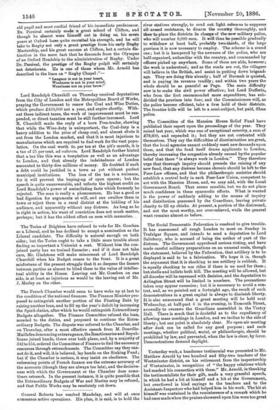Lord Randolph Churchill on Thursday received deputations from the City
of London and the Metropolitan Board of Works, praying the Government to renew the Coal and Wine Duties, which produce £450,000 net a year, and expire shortly. With- out these indirect taxes, the work of improvement must be sus- pended, or direct taxation must be still further increased. Lord R. Churchill made the reply of a born Free-trader, showing that while the Wine-duty is unimportant, the Coal-duty is a heavy addition to the price of cheap coal, and almost shuts it out from the London market, and that it is most injurious to manufactures which are required to find work for the vast popu- lation. On the coal worth 4s. per ton at the pit's mouth, it is a tax of 25 per cent. ad valorem. Lord Randolph further hinted that a tax like this was a temptation as well as an advantage to London, and that already the indebtedness of London amounted to thirty-five millions of money. He doubted if such a debt could be justified in a town as yet without perfect
municipal institutions. The loss of the tax is a nuisance, for it will prevent the buying-up of open spaces ; but the speech is quite unanswerable, and reflects the highest credit on Lord Randolph's power of assimilating facts which formerly he rejected. The man is really a phenomenon. He has a good or bad digestion for arguments at will, and can swallow them in town or reject them in a rural district at the bidding of his audience, and apparently without any distress. As long as he is right in action, his want of conviction does not much matter, perhaps; but it has the oddest effect on men with memories.


































 Previous page
Previous page